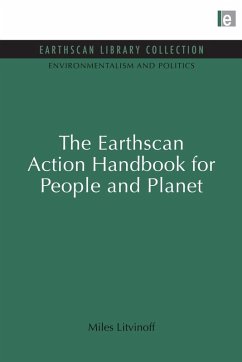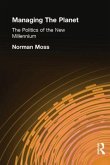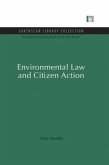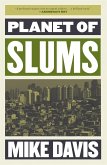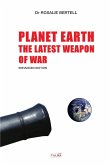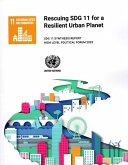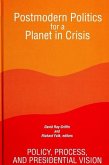Miles Litvinoff
The Earthscan Action Handbook for People and Planet
Miles Litvinoff
The Earthscan Action Handbook for People and Planet
- Broschiertes Buch
- Merkliste
- Auf die Merkliste
- Bewerten Bewerten
- Teilen
- Produkt teilen
- Produkterinnerung
- Produkterinnerung
We have poisoned the air and water on which our lives depend. Poor countries exhaust their land in the struggle to survive while rich countries demand more and more. The Earthscan Action Handbook spells out why things have gone so terribly wrong and what each of us can do to clean up the mess. Each chapter deals with one of the major problems people and the planet now face: meeting the human needs of health, education and social justice as well as the environmental needs of our dying lakes and forests, polluted seas, threatened habitats and endangered species. Packed with suggestions for…mehr
Andere Kunden interessierten sich auch für
![Managing the Planet Managing the Planet]() Norman MossManaging the Planet49,99 €
Norman MossManaging the Planet49,99 €![Feminism or Death Feminism or Death]() Francoise D'EaubonneFeminism or Death20,99 €
Francoise D'EaubonneFeminism or Death20,99 €![Environmental Law and Citizen Action Environmental Law and Citizen Action]() Alan MurdieEnvironmental Law and Citizen Action63,99 €
Alan MurdieEnvironmental Law and Citizen Action63,99 €![Planet of Slums Planet of Slums]() Mike DavisPlanet of Slums9,49 €
Mike DavisPlanet of Slums9,49 €![Planet Earth Planet Earth]() Rosalie BertellPlanet Earth20,99 €
Rosalie BertellPlanet Earth20,99 €![Rescuing Sdg 11 for a Resilient Urban Planet Rescuing Sdg 11 for a Resilient Urban Planet]() Rescuing Sdg 11 for a Resilient Urban Planet51,99 €
Rescuing Sdg 11 for a Resilient Urban Planet51,99 €![Postmodern Politics for a Planet in Crisis Postmodern Politics for a Planet in Crisis]() Postmodern Politics for a Planet in Crisis24,99 €
Postmodern Politics for a Planet in Crisis24,99 €-
-
-
We have poisoned the air and water on which our lives depend. Poor countries exhaust their land in the struggle to survive while rich countries demand more and more. The Earthscan Action Handbook spells out why things have gone so terribly wrong and what each of us can do to clean up the mess. Each chapter deals with one of the major problems people and the planet now face: meeting the human needs of health, education and social justice as well as the environmental needs of our dying lakes and forests, polluted seas, threatened habitats and endangered species. Packed with suggestions for positive action, this book also gives details of who to contact, what to read and where to go if you want to do more. Whether you care about buying safe food or feeding the world, The Earthscan Action Handbook is indispensable. Originally published in 1990
Produktdetails
- Produktdetails
- Verlag: Routledge
- Seitenzahl: 356
- Erscheinungstermin: 1. März 2013
- Englisch
- Abmessung: 234mm x 156mm x 19mm
- Gewicht: 541g
- ISBN-13: 9780415847179
- ISBN-10: 0415847176
- Artikelnr.: 37085367
- Herstellerkennzeichnung
- Libri GmbH
- Europaallee 1
- 36244 Bad Hersfeld
- gpsr@libri.de
- Verlag: Routledge
- Seitenzahl: 356
- Erscheinungstermin: 1. März 2013
- Englisch
- Abmessung: 234mm x 156mm x 19mm
- Gewicht: 541g
- ISBN-13: 9780415847179
- ISBN-10: 0415847176
- Artikelnr.: 37085367
- Herstellerkennzeichnung
- Libri GmbH
- Europaallee 1
- 36244 Bad Hersfeld
- gpsr@libri.de
Miles Litvinoff
About This Book Aims of the book
Action: Solutions
Letter-writing
Campaigning
Definitions
Acknowledgements List of Abbreviations Part One: Human Needs 1. Food - the Right to Eat The Problem: Peoples of the past: in Tune with Nature
the First Environmentalists
Colonialism: Cash Crops and Commodities
No Food for the Landless
Farming for the Rich: International Trade
Aid and Inefficiency
Environmental Destruction: Mechanized Agriculture
Wood for Fuel
Overfishing
Escaping the Consequences
the 'green revolution': Miracle Seeds?
New Problems
Pests and Pesticides
Irrigation
who Gained?
Food Aid: 'Grain Junkies'
Political Bias. Action: Hunger: Children
Women
Land Reform
Soil Restoration
Rural Development
Social Change
the NGOs
Self-reliance
Northern Production and Consumption
Fishing
Food Aid. Getting Involved: Consumer and Lifestyle Choices: buy Direct
Boycott Products
Go Vegetarian
Buy Organic
Grow your Own
your Lifestyle
Community and Political Action: Videos
World Food Day
Oxfam - Hungry for Change
Tell them what you Think
Organizations. 2. Wealth - Greed versus Need The Problem: Unequal Partners
Multinationals
The World Bank: Giant Dams
Displacing People
Southern Debt: what Went Wrong?
the Power of Oil
Money Down the Drain
Enter the IMF
the Debt Crisis
And the Good News? Action: The Wealth Gap: Human Development
Grass Roots
New Priorities
Self-reliance
Regional Co-operation
Controlling the Corporations
Appropriate Development
Urban Renewal of Rural Investment
Exploited Labour
Rewriting Debts
Reforming World Trade
what we Owe the South. Getting Involved: Consumer and Lifestyle Choices: Fair Trading
Boycott the Offenders
Ethical Investment
Community and Political Action: Intermediate Technology
Oxfam 2000
In Whose Interest?
Tell them what you Think
Organizations. 3. Population and Health 60 The Problem: Population - Still Soaring: Population Mathematics
Upsetting the Balance
Disease in the South: Water and Sanitation
Health Care
the Corporations
Poisons on the Land
Legal Standards
Misuse and Accidents
Different Safety Standards
do Pesticides Work?
Nitrates
Chemical Poisons in Industry: Worldwide Problem
Dioxins
Landfill and Contamination
Accidents will Happen
Weak Laws
the Poison Trade
Contaminated Air
Radiation: the Anti-nuclear Case
Nuclear Tests
Nuclear Accidents. Action: Population and Health: Appropriate Family Planning
Better Opportunities for Women
Preventive Health Care
Water and Sanitation
Local Solutions
Primary Health Care
the Multinationals
Traditional Medicines
Fewer Poisons
Integrated Pest Management
Tighter Controls
Alternative Processes
Polluter Pays
Nuclear Waste. Getting Involved: Consumer and Lifestyle Choices: Small Families
Wealth and Income Redistribution
Consumer Boycotts
Buying Safely
Converting Giving up your Car
Water Quality
Better Personal Health
Community and political Action: Tell them what you Think
an End to Secrecy
Water Contamination
Waste Dumping
Nuclear Power
Organizations. 4. Women - Present Burdens and Future Role The Problem: Discrimination under the Law: the Weight of Tradition
Work in the Home
Women's Health
Marriage and Motherhood
Domestic Violence
Divorce
Women as Farmers: Colonial Disruption
Ignoring Women's Role
Women in the Modern Economy: Inequality in Employment
Obstacles for Working Mothers
New Technology
Unemployment and Poverty
Women in a Man's World: Education
Fertility
Politics
Rape. Action: Women's Burdens and Role: Collective Action
Legal Rights
Culture
Women and Work
Women and Development
Rural Women. Getting Involved: Consumer and Lifestyle Choices: Buy from Women
Changes at Home
Equal Treatment for Boys and Girls
Women's Refuges
Workplace, Community and Political Action: Equal Pay
Co-ops
Child Care
Self-development
Organizations. 5. Human and Civil Rights The Problem: Children and Education: Early Drop-outs
Child Labour
Street Children
the Adoption Trade
Victims of War
Indigenous Peoples: European Conquest
Pushed into Poverty
Forest and Mountain People
Oppression Worldwide
Genocide
the Cost
The Violent State: Political Prisoners
Latin America
Asia
Middle East
Africa
South Africa
Rights in the North: Poverty and Injustice in the West
the High Cost of Northern Wealth
Support for Oppression
Eastern Europe
The Future. Action: Human Rights: Making Choices
Rights of the Child
Community Schooling
Protection
Indigenous Peoples
a Change in Material Values
Political Will
Public Opinion
Strengthening the UN
better Democracy. Getting Involved: Consumer and Lifestyle Choices: Buy from Fair traders
Community and Political Action
Letter-Writing
in the Workplace
Education
Survival International
Amnesty International
Central America Week
Broader Issues
UK Democracy
Organizations. Part Two: The Planet 6. Working the Land to Death The Problem: Disappearing Forests: an Essential Resource
Worldwide Destruction
Deforestation - the Causes: Blaming the Rural Poor
Rural Defenders
Commercial Exploitation
Dams and Mining
Migration Programmes
Deforestation - the Real Costs: who Benefits?
Environmental Damage
Less Rainfall more Drought
Firewood Crisis
Forest Peoples
Death of the Soil: Soil Loss Ancient and Modern
the Deserts Advance
Destructive Farming
Mismanaged Irrigation. Action: Deforestation and Soil Loss: Problems with 'Sustainability'
Damage Limitation
International Bans and Campaigns
Alternatives
Extractive Reserves
no More Big Developments
New Trees
Local Control
Local Solutions
Soil Management
Livestock
Irrigation. Getting Involved: Consumer and Lifestyle Choices
Avoid Hardwoods
Tell them what you Think
Food Choices
Recycling Paper and Card
Plant Trees
Community and Political Action: Join Campaigns
National Tree Week
Reforest the Earth
Make the Connections
Letter-writing
Organizations. 7. Water - the Most Precious Resource The Problem: Water Rich and Water Poor: Heavy Water Users
Exhausting Supplies
Access to Water
Increasing Demand
Flooding
Irrigation and Large Dams - Hidden Costs: Irrigation
how Dams Go Wrong
Dirty Inland Waters: Disease and Waste
Waters of the North
Chemical and Nuclear Contamination
Filthy Seas: the Effects of Dumping
Nuclear Waste
no Escape Route
Damage to Fishing. Action: Water Use and Abuse: Conservation
Dual Solution
Political Action
Flood and Irrigation Controls
Recovery Time
Industry and Agriculture
Recycling
Meeting the Cost
Enforcement of Standards. Getting Involved: Consumer and Lifestyle Choices: use Water Sparingly
Buy Wisely
Fewer Chemicals and Batteries
Recycle Paper and Other Products
Plastics
Boat Users
Community and Political Action
Water Metering
Recycling Schemes
Limiting Landfill
Report Pollution Incidents
Organizations. 8. The Atmosphere -the Sky's the Limit The Problem: Global Warming: the Stratosphere
Rising Temperatures
Greenhouse Gases
too Hot to Handle
Rising Seas and Refugees
Disappearing Habitats
The Hole in the Ozone Layer: what Causes it?
Depletion Rate
the Effects
Airborne Acid: the Causes
Widely Travelled Pollution
how Serious?
'Forest Death'
Waterways and Fish
Other Damage. Action: Atmosphere and Climate: Preventive Measures
Planting New Trees
Curbing CO,
Energy Efficiency
Recycling
Government Action
Restoring a Balance
Nuclear Power
Alternative Energy
Less Motor Car Use
CFCs
Acid Pollution
Cleaner Power Stations
Catalytic Converters. Getting Involved: Consumer and Lifestyle Choices: Conserve Energy and Heat
Recycling Schemes
Organic Foods
Avoid CFCs
Less Driving more Cycling
Environmental Transport Association
Community and Political Action: for Youngsters
UK Government
Campaign against Nuclear Power
Environment-Friendly Transport
Organizations. 9. Habitats and Species - Nature under Siege The Problem: The Importance of Biological Diversity: Species Co-operation
Disrupting the System
Nature's Wealth
Medicinal Plants
Untapped Potential
Disappearing Worlds: the Rainforests
Wetlands and Coral Reefs
Islands
Grassland and Wilderness
Antarctica
Vanishing Species: Wildlife Trade
Plants
Invertebrates
Fish, Amphibians and Reptiles
Birds
Larger Mammals
Elephants
Rhinos
on the Brink
Migration Routes
the Big Cats
Primates
Modern Farming
Mammals at Sea. Action: Habitats and Species: Parks and Reserves
Wilderness Corridors
Success Stories
Zoos and Gardens
Farming for Conservation
Strategy for Survival
Species Census
the Rainforests
Wildlife Trade Convention
Alternatives to Trade
Wildlife Ranching
Whaling Ban
'World Park' for Antarctica
a New Outlook. Getting Involved: Consumer and Lifestyle Choices: Interrelated Action
Care for Wildlife
Consume Carefully
Criticize and Boycott
Teach Respect
Wildlife Gardens, Trees, Recycling
Community and Political Action: Protect Local Habitats
Conservation Volunteers
Lobby the Government
Support Campaigns
Organizations. 10. A World without War? The Problem: Weapons and Wars: the Nuclear Threat
who has the Bomb?
Chemical and other Weapons
Worldwide War
Today's Battlefields
Superpowers and Cold War: the Cold War
the Arms Race
Star Wars
the Future
The Real Cost of Military Spending: Opportunity Costs
Inflation and Jobs
the Myth of the Spin-off
Social Costs
Knock-on Effects
the Price of Power
Wasting Resources
Environmental Damage
the Military Obsession
The Arms Trade: the Background
Competitive Market
Prolonging War
Secret Deals. Action: War and the Arms Race: the Role of the UN
International Treaties
Strengthening the UN
Peace Dividend?
NATO and the Warsaw Pact
Nuclear Test Ban
Dissolve the Alliances
Chemical Weapons
Disarmament and Development
Controlling Sales
Arms Conversion
the Peace Movement. Getting Involved: Consumer and Lifestyle Choices: Make Do with Less
Avoid Competition
Oppose Violence
Workplace, Community and Political Action:-International Links
Industrial Conversion
Lobby for Peace
Peace Studies
Organizations. Glossary Notes Recommended Reading Index
Action: Solutions
Letter-writing
Campaigning
Definitions
Acknowledgements List of Abbreviations Part One: Human Needs 1. Food - the Right to Eat The Problem: Peoples of the past: in Tune with Nature
the First Environmentalists
Colonialism: Cash Crops and Commodities
No Food for the Landless
Farming for the Rich: International Trade
Aid and Inefficiency
Environmental Destruction: Mechanized Agriculture
Wood for Fuel
Overfishing
Escaping the Consequences
the 'green revolution': Miracle Seeds?
New Problems
Pests and Pesticides
Irrigation
who Gained?
Food Aid: 'Grain Junkies'
Political Bias. Action: Hunger: Children
Women
Land Reform
Soil Restoration
Rural Development
Social Change
the NGOs
Self-reliance
Northern Production and Consumption
Fishing
Food Aid. Getting Involved: Consumer and Lifestyle Choices: buy Direct
Boycott Products
Go Vegetarian
Buy Organic
Grow your Own
your Lifestyle
Community and Political Action: Videos
World Food Day
Oxfam - Hungry for Change
Tell them what you Think
Organizations. 2. Wealth - Greed versus Need The Problem: Unequal Partners
Multinationals
The World Bank: Giant Dams
Displacing People
Southern Debt: what Went Wrong?
the Power of Oil
Money Down the Drain
Enter the IMF
the Debt Crisis
And the Good News? Action: The Wealth Gap: Human Development
Grass Roots
New Priorities
Self-reliance
Regional Co-operation
Controlling the Corporations
Appropriate Development
Urban Renewal of Rural Investment
Exploited Labour
Rewriting Debts
Reforming World Trade
what we Owe the South. Getting Involved: Consumer and Lifestyle Choices: Fair Trading
Boycott the Offenders
Ethical Investment
Community and Political Action: Intermediate Technology
Oxfam 2000
In Whose Interest?
Tell them what you Think
Organizations. 3. Population and Health 60 The Problem: Population - Still Soaring: Population Mathematics
Upsetting the Balance
Disease in the South: Water and Sanitation
Health Care
the Corporations
Poisons on the Land
Legal Standards
Misuse and Accidents
Different Safety Standards
do Pesticides Work?
Nitrates
Chemical Poisons in Industry: Worldwide Problem
Dioxins
Landfill and Contamination
Accidents will Happen
Weak Laws
the Poison Trade
Contaminated Air
Radiation: the Anti-nuclear Case
Nuclear Tests
Nuclear Accidents. Action: Population and Health: Appropriate Family Planning
Better Opportunities for Women
Preventive Health Care
Water and Sanitation
Local Solutions
Primary Health Care
the Multinationals
Traditional Medicines
Fewer Poisons
Integrated Pest Management
Tighter Controls
Alternative Processes
Polluter Pays
Nuclear Waste. Getting Involved: Consumer and Lifestyle Choices: Small Families
Wealth and Income Redistribution
Consumer Boycotts
Buying Safely
Converting Giving up your Car
Water Quality
Better Personal Health
Community and political Action: Tell them what you Think
an End to Secrecy
Water Contamination
Waste Dumping
Nuclear Power
Organizations. 4. Women - Present Burdens and Future Role The Problem: Discrimination under the Law: the Weight of Tradition
Work in the Home
Women's Health
Marriage and Motherhood
Domestic Violence
Divorce
Women as Farmers: Colonial Disruption
Ignoring Women's Role
Women in the Modern Economy: Inequality in Employment
Obstacles for Working Mothers
New Technology
Unemployment and Poverty
Women in a Man's World: Education
Fertility
Politics
Rape. Action: Women's Burdens and Role: Collective Action
Legal Rights
Culture
Women and Work
Women and Development
Rural Women. Getting Involved: Consumer and Lifestyle Choices: Buy from Women
Changes at Home
Equal Treatment for Boys and Girls
Women's Refuges
Workplace, Community and Political Action: Equal Pay
Co-ops
Child Care
Self-development
Organizations. 5. Human and Civil Rights The Problem: Children and Education: Early Drop-outs
Child Labour
Street Children
the Adoption Trade
Victims of War
Indigenous Peoples: European Conquest
Pushed into Poverty
Forest and Mountain People
Oppression Worldwide
Genocide
the Cost
The Violent State: Political Prisoners
Latin America
Asia
Middle East
Africa
South Africa
Rights in the North: Poverty and Injustice in the West
the High Cost of Northern Wealth
Support for Oppression
Eastern Europe
The Future. Action: Human Rights: Making Choices
Rights of the Child
Community Schooling
Protection
Indigenous Peoples
a Change in Material Values
Political Will
Public Opinion
Strengthening the UN
better Democracy. Getting Involved: Consumer and Lifestyle Choices: Buy from Fair traders
Community and Political Action
Letter-Writing
in the Workplace
Education
Survival International
Amnesty International
Central America Week
Broader Issues
UK Democracy
Organizations. Part Two: The Planet 6. Working the Land to Death The Problem: Disappearing Forests: an Essential Resource
Worldwide Destruction
Deforestation - the Causes: Blaming the Rural Poor
Rural Defenders
Commercial Exploitation
Dams and Mining
Migration Programmes
Deforestation - the Real Costs: who Benefits?
Environmental Damage
Less Rainfall more Drought
Firewood Crisis
Forest Peoples
Death of the Soil: Soil Loss Ancient and Modern
the Deserts Advance
Destructive Farming
Mismanaged Irrigation. Action: Deforestation and Soil Loss: Problems with 'Sustainability'
Damage Limitation
International Bans and Campaigns
Alternatives
Extractive Reserves
no More Big Developments
New Trees
Local Control
Local Solutions
Soil Management
Livestock
Irrigation. Getting Involved: Consumer and Lifestyle Choices
Avoid Hardwoods
Tell them what you Think
Food Choices
Recycling Paper and Card
Plant Trees
Community and Political Action: Join Campaigns
National Tree Week
Reforest the Earth
Make the Connections
Letter-writing
Organizations. 7. Water - the Most Precious Resource The Problem: Water Rich and Water Poor: Heavy Water Users
Exhausting Supplies
Access to Water
Increasing Demand
Flooding
Irrigation and Large Dams - Hidden Costs: Irrigation
how Dams Go Wrong
Dirty Inland Waters: Disease and Waste
Waters of the North
Chemical and Nuclear Contamination
Filthy Seas: the Effects of Dumping
Nuclear Waste
no Escape Route
Damage to Fishing. Action: Water Use and Abuse: Conservation
Dual Solution
Political Action
Flood and Irrigation Controls
Recovery Time
Industry and Agriculture
Recycling
Meeting the Cost
Enforcement of Standards. Getting Involved: Consumer and Lifestyle Choices: use Water Sparingly
Buy Wisely
Fewer Chemicals and Batteries
Recycle Paper and Other Products
Plastics
Boat Users
Community and Political Action
Water Metering
Recycling Schemes
Limiting Landfill
Report Pollution Incidents
Organizations. 8. The Atmosphere -the Sky's the Limit The Problem: Global Warming: the Stratosphere
Rising Temperatures
Greenhouse Gases
too Hot to Handle
Rising Seas and Refugees
Disappearing Habitats
The Hole in the Ozone Layer: what Causes it?
Depletion Rate
the Effects
Airborne Acid: the Causes
Widely Travelled Pollution
how Serious?
'Forest Death'
Waterways and Fish
Other Damage. Action: Atmosphere and Climate: Preventive Measures
Planting New Trees
Curbing CO,
Energy Efficiency
Recycling
Government Action
Restoring a Balance
Nuclear Power
Alternative Energy
Less Motor Car Use
CFCs
Acid Pollution
Cleaner Power Stations
Catalytic Converters. Getting Involved: Consumer and Lifestyle Choices: Conserve Energy and Heat
Recycling Schemes
Organic Foods
Avoid CFCs
Less Driving more Cycling
Environmental Transport Association
Community and Political Action: for Youngsters
UK Government
Campaign against Nuclear Power
Environment-Friendly Transport
Organizations. 9. Habitats and Species - Nature under Siege The Problem: The Importance of Biological Diversity: Species Co-operation
Disrupting the System
Nature's Wealth
Medicinal Plants
Untapped Potential
Disappearing Worlds: the Rainforests
Wetlands and Coral Reefs
Islands
Grassland and Wilderness
Antarctica
Vanishing Species: Wildlife Trade
Plants
Invertebrates
Fish, Amphibians and Reptiles
Birds
Larger Mammals
Elephants
Rhinos
on the Brink
Migration Routes
the Big Cats
Primates
Modern Farming
Mammals at Sea. Action: Habitats and Species: Parks and Reserves
Wilderness Corridors
Success Stories
Zoos and Gardens
Farming for Conservation
Strategy for Survival
Species Census
the Rainforests
Wildlife Trade Convention
Alternatives to Trade
Wildlife Ranching
Whaling Ban
'World Park' for Antarctica
a New Outlook. Getting Involved: Consumer and Lifestyle Choices: Interrelated Action
Care for Wildlife
Consume Carefully
Criticize and Boycott
Teach Respect
Wildlife Gardens, Trees, Recycling
Community and Political Action: Protect Local Habitats
Conservation Volunteers
Lobby the Government
Support Campaigns
Organizations. 10. A World without War? The Problem: Weapons and Wars: the Nuclear Threat
who has the Bomb?
Chemical and other Weapons
Worldwide War
Today's Battlefields
Superpowers and Cold War: the Cold War
the Arms Race
Star Wars
the Future
The Real Cost of Military Spending: Opportunity Costs
Inflation and Jobs
the Myth of the Spin-off
Social Costs
Knock-on Effects
the Price of Power
Wasting Resources
Environmental Damage
the Military Obsession
The Arms Trade: the Background
Competitive Market
Prolonging War
Secret Deals. Action: War and the Arms Race: the Role of the UN
International Treaties
Strengthening the UN
Peace Dividend?
NATO and the Warsaw Pact
Nuclear Test Ban
Dissolve the Alliances
Chemical Weapons
Disarmament and Development
Controlling Sales
Arms Conversion
the Peace Movement. Getting Involved: Consumer and Lifestyle Choices: Make Do with Less
Avoid Competition
Oppose Violence
Workplace, Community and Political Action:-International Links
Industrial Conversion
Lobby for Peace
Peace Studies
Organizations. Glossary Notes Recommended Reading Index
About This Book Aims of the book
Action: Solutions
Letter-writing
Campaigning
Definitions
Acknowledgements List of Abbreviations Part One: Human Needs 1. Food - the Right to Eat The Problem: Peoples of the past: in Tune with Nature
the First Environmentalists
Colonialism: Cash Crops and Commodities
No Food for the Landless
Farming for the Rich: International Trade
Aid and Inefficiency
Environmental Destruction: Mechanized Agriculture
Wood for Fuel
Overfishing
Escaping the Consequences
the 'green revolution': Miracle Seeds?
New Problems
Pests and Pesticides
Irrigation
who Gained?
Food Aid: 'Grain Junkies'
Political Bias. Action: Hunger: Children
Women
Land Reform
Soil Restoration
Rural Development
Social Change
the NGOs
Self-reliance
Northern Production and Consumption
Fishing
Food Aid. Getting Involved: Consumer and Lifestyle Choices: buy Direct
Boycott Products
Go Vegetarian
Buy Organic
Grow your Own
your Lifestyle
Community and Political Action: Videos
World Food Day
Oxfam - Hungry for Change
Tell them what you Think
Organizations. 2. Wealth - Greed versus Need The Problem: Unequal Partners
Multinationals
The World Bank: Giant Dams
Displacing People
Southern Debt: what Went Wrong?
the Power of Oil
Money Down the Drain
Enter the IMF
the Debt Crisis
And the Good News? Action: The Wealth Gap: Human Development
Grass Roots
New Priorities
Self-reliance
Regional Co-operation
Controlling the Corporations
Appropriate Development
Urban Renewal of Rural Investment
Exploited Labour
Rewriting Debts
Reforming World Trade
what we Owe the South. Getting Involved: Consumer and Lifestyle Choices: Fair Trading
Boycott the Offenders
Ethical Investment
Community and Political Action: Intermediate Technology
Oxfam 2000
In Whose Interest?
Tell them what you Think
Organizations. 3. Population and Health 60 The Problem: Population - Still Soaring: Population Mathematics
Upsetting the Balance
Disease in the South: Water and Sanitation
Health Care
the Corporations
Poisons on the Land
Legal Standards
Misuse and Accidents
Different Safety Standards
do Pesticides Work?
Nitrates
Chemical Poisons in Industry: Worldwide Problem
Dioxins
Landfill and Contamination
Accidents will Happen
Weak Laws
the Poison Trade
Contaminated Air
Radiation: the Anti-nuclear Case
Nuclear Tests
Nuclear Accidents. Action: Population and Health: Appropriate Family Planning
Better Opportunities for Women
Preventive Health Care
Water and Sanitation
Local Solutions
Primary Health Care
the Multinationals
Traditional Medicines
Fewer Poisons
Integrated Pest Management
Tighter Controls
Alternative Processes
Polluter Pays
Nuclear Waste. Getting Involved: Consumer and Lifestyle Choices: Small Families
Wealth and Income Redistribution
Consumer Boycotts
Buying Safely
Converting Giving up your Car
Water Quality
Better Personal Health
Community and political Action: Tell them what you Think
an End to Secrecy
Water Contamination
Waste Dumping
Nuclear Power
Organizations. 4. Women - Present Burdens and Future Role The Problem: Discrimination under the Law: the Weight of Tradition
Work in the Home
Women's Health
Marriage and Motherhood
Domestic Violence
Divorce
Women as Farmers: Colonial Disruption
Ignoring Women's Role
Women in the Modern Economy: Inequality in Employment
Obstacles for Working Mothers
New Technology
Unemployment and Poverty
Women in a Man's World: Education
Fertility
Politics
Rape. Action: Women's Burdens and Role: Collective Action
Legal Rights
Culture
Women and Work
Women and Development
Rural Women. Getting Involved: Consumer and Lifestyle Choices: Buy from Women
Changes at Home
Equal Treatment for Boys and Girls
Women's Refuges
Workplace, Community and Political Action: Equal Pay
Co-ops
Child Care
Self-development
Organizations. 5. Human and Civil Rights The Problem: Children and Education: Early Drop-outs
Child Labour
Street Children
the Adoption Trade
Victims of War
Indigenous Peoples: European Conquest
Pushed into Poverty
Forest and Mountain People
Oppression Worldwide
Genocide
the Cost
The Violent State: Political Prisoners
Latin America
Asia
Middle East
Africa
South Africa
Rights in the North: Poverty and Injustice in the West
the High Cost of Northern Wealth
Support for Oppression
Eastern Europe
The Future. Action: Human Rights: Making Choices
Rights of the Child
Community Schooling
Protection
Indigenous Peoples
a Change in Material Values
Political Will
Public Opinion
Strengthening the UN
better Democracy. Getting Involved: Consumer and Lifestyle Choices: Buy from Fair traders
Community and Political Action
Letter-Writing
in the Workplace
Education
Survival International
Amnesty International
Central America Week
Broader Issues
UK Democracy
Organizations. Part Two: The Planet 6. Working the Land to Death The Problem: Disappearing Forests: an Essential Resource
Worldwide Destruction
Deforestation - the Causes: Blaming the Rural Poor
Rural Defenders
Commercial Exploitation
Dams and Mining
Migration Programmes
Deforestation - the Real Costs: who Benefits?
Environmental Damage
Less Rainfall more Drought
Firewood Crisis
Forest Peoples
Death of the Soil: Soil Loss Ancient and Modern
the Deserts Advance
Destructive Farming
Mismanaged Irrigation. Action: Deforestation and Soil Loss: Problems with 'Sustainability'
Damage Limitation
International Bans and Campaigns
Alternatives
Extractive Reserves
no More Big Developments
New Trees
Local Control
Local Solutions
Soil Management
Livestock
Irrigation. Getting Involved: Consumer and Lifestyle Choices
Avoid Hardwoods
Tell them what you Think
Food Choices
Recycling Paper and Card
Plant Trees
Community and Political Action: Join Campaigns
National Tree Week
Reforest the Earth
Make the Connections
Letter-writing
Organizations. 7. Water - the Most Precious Resource The Problem: Water Rich and Water Poor: Heavy Water Users
Exhausting Supplies
Access to Water
Increasing Demand
Flooding
Irrigation and Large Dams - Hidden Costs: Irrigation
how Dams Go Wrong
Dirty Inland Waters: Disease and Waste
Waters of the North
Chemical and Nuclear Contamination
Filthy Seas: the Effects of Dumping
Nuclear Waste
no Escape Route
Damage to Fishing. Action: Water Use and Abuse: Conservation
Dual Solution
Political Action
Flood and Irrigation Controls
Recovery Time
Industry and Agriculture
Recycling
Meeting the Cost
Enforcement of Standards. Getting Involved: Consumer and Lifestyle Choices: use Water Sparingly
Buy Wisely
Fewer Chemicals and Batteries
Recycle Paper and Other Products
Plastics
Boat Users
Community and Political Action
Water Metering
Recycling Schemes
Limiting Landfill
Report Pollution Incidents
Organizations. 8. The Atmosphere -the Sky's the Limit The Problem: Global Warming: the Stratosphere
Rising Temperatures
Greenhouse Gases
too Hot to Handle
Rising Seas and Refugees
Disappearing Habitats
The Hole in the Ozone Layer: what Causes it?
Depletion Rate
the Effects
Airborne Acid: the Causes
Widely Travelled Pollution
how Serious?
'Forest Death'
Waterways and Fish
Other Damage. Action: Atmosphere and Climate: Preventive Measures
Planting New Trees
Curbing CO,
Energy Efficiency
Recycling
Government Action
Restoring a Balance
Nuclear Power
Alternative Energy
Less Motor Car Use
CFCs
Acid Pollution
Cleaner Power Stations
Catalytic Converters. Getting Involved: Consumer and Lifestyle Choices: Conserve Energy and Heat
Recycling Schemes
Organic Foods
Avoid CFCs
Less Driving more Cycling
Environmental Transport Association
Community and Political Action: for Youngsters
UK Government
Campaign against Nuclear Power
Environment-Friendly Transport
Organizations. 9. Habitats and Species - Nature under Siege The Problem: The Importance of Biological Diversity: Species Co-operation
Disrupting the System
Nature's Wealth
Medicinal Plants
Untapped Potential
Disappearing Worlds: the Rainforests
Wetlands and Coral Reefs
Islands
Grassland and Wilderness
Antarctica
Vanishing Species: Wildlife Trade
Plants
Invertebrates
Fish, Amphibians and Reptiles
Birds
Larger Mammals
Elephants
Rhinos
on the Brink
Migration Routes
the Big Cats
Primates
Modern Farming
Mammals at Sea. Action: Habitats and Species: Parks and Reserves
Wilderness Corridors
Success Stories
Zoos and Gardens
Farming for Conservation
Strategy for Survival
Species Census
the Rainforests
Wildlife Trade Convention
Alternatives to Trade
Wildlife Ranching
Whaling Ban
'World Park' for Antarctica
a New Outlook. Getting Involved: Consumer and Lifestyle Choices: Interrelated Action
Care for Wildlife
Consume Carefully
Criticize and Boycott
Teach Respect
Wildlife Gardens, Trees, Recycling
Community and Political Action: Protect Local Habitats
Conservation Volunteers
Lobby the Government
Support Campaigns
Organizations. 10. A World without War? The Problem: Weapons and Wars: the Nuclear Threat
who has the Bomb?
Chemical and other Weapons
Worldwide War
Today's Battlefields
Superpowers and Cold War: the Cold War
the Arms Race
Star Wars
the Future
The Real Cost of Military Spending: Opportunity Costs
Inflation and Jobs
the Myth of the Spin-off
Social Costs
Knock-on Effects
the Price of Power
Wasting Resources
Environmental Damage
the Military Obsession
The Arms Trade: the Background
Competitive Market
Prolonging War
Secret Deals. Action: War and the Arms Race: the Role of the UN
International Treaties
Strengthening the UN
Peace Dividend?
NATO and the Warsaw Pact
Nuclear Test Ban
Dissolve the Alliances
Chemical Weapons
Disarmament and Development
Controlling Sales
Arms Conversion
the Peace Movement. Getting Involved: Consumer and Lifestyle Choices: Make Do with Less
Avoid Competition
Oppose Violence
Workplace, Community and Political Action:-International Links
Industrial Conversion
Lobby for Peace
Peace Studies
Organizations. Glossary Notes Recommended Reading Index
Action: Solutions
Letter-writing
Campaigning
Definitions
Acknowledgements List of Abbreviations Part One: Human Needs 1. Food - the Right to Eat The Problem: Peoples of the past: in Tune with Nature
the First Environmentalists
Colonialism: Cash Crops and Commodities
No Food for the Landless
Farming for the Rich: International Trade
Aid and Inefficiency
Environmental Destruction: Mechanized Agriculture
Wood for Fuel
Overfishing
Escaping the Consequences
the 'green revolution': Miracle Seeds?
New Problems
Pests and Pesticides
Irrigation
who Gained?
Food Aid: 'Grain Junkies'
Political Bias. Action: Hunger: Children
Women
Land Reform
Soil Restoration
Rural Development
Social Change
the NGOs
Self-reliance
Northern Production and Consumption
Fishing
Food Aid. Getting Involved: Consumer and Lifestyle Choices: buy Direct
Boycott Products
Go Vegetarian
Buy Organic
Grow your Own
your Lifestyle
Community and Political Action: Videos
World Food Day
Oxfam - Hungry for Change
Tell them what you Think
Organizations. 2. Wealth - Greed versus Need The Problem: Unequal Partners
Multinationals
The World Bank: Giant Dams
Displacing People
Southern Debt: what Went Wrong?
the Power of Oil
Money Down the Drain
Enter the IMF
the Debt Crisis
And the Good News? Action: The Wealth Gap: Human Development
Grass Roots
New Priorities
Self-reliance
Regional Co-operation
Controlling the Corporations
Appropriate Development
Urban Renewal of Rural Investment
Exploited Labour
Rewriting Debts
Reforming World Trade
what we Owe the South. Getting Involved: Consumer and Lifestyle Choices: Fair Trading
Boycott the Offenders
Ethical Investment
Community and Political Action: Intermediate Technology
Oxfam 2000
In Whose Interest?
Tell them what you Think
Organizations. 3. Population and Health 60 The Problem: Population - Still Soaring: Population Mathematics
Upsetting the Balance
Disease in the South: Water and Sanitation
Health Care
the Corporations
Poisons on the Land
Legal Standards
Misuse and Accidents
Different Safety Standards
do Pesticides Work?
Nitrates
Chemical Poisons in Industry: Worldwide Problem
Dioxins
Landfill and Contamination
Accidents will Happen
Weak Laws
the Poison Trade
Contaminated Air
Radiation: the Anti-nuclear Case
Nuclear Tests
Nuclear Accidents. Action: Population and Health: Appropriate Family Planning
Better Opportunities for Women
Preventive Health Care
Water and Sanitation
Local Solutions
Primary Health Care
the Multinationals
Traditional Medicines
Fewer Poisons
Integrated Pest Management
Tighter Controls
Alternative Processes
Polluter Pays
Nuclear Waste. Getting Involved: Consumer and Lifestyle Choices: Small Families
Wealth and Income Redistribution
Consumer Boycotts
Buying Safely
Converting Giving up your Car
Water Quality
Better Personal Health
Community and political Action: Tell them what you Think
an End to Secrecy
Water Contamination
Waste Dumping
Nuclear Power
Organizations. 4. Women - Present Burdens and Future Role The Problem: Discrimination under the Law: the Weight of Tradition
Work in the Home
Women's Health
Marriage and Motherhood
Domestic Violence
Divorce
Women as Farmers: Colonial Disruption
Ignoring Women's Role
Women in the Modern Economy: Inequality in Employment
Obstacles for Working Mothers
New Technology
Unemployment and Poverty
Women in a Man's World: Education
Fertility
Politics
Rape. Action: Women's Burdens and Role: Collective Action
Legal Rights
Culture
Women and Work
Women and Development
Rural Women. Getting Involved: Consumer and Lifestyle Choices: Buy from Women
Changes at Home
Equal Treatment for Boys and Girls
Women's Refuges
Workplace, Community and Political Action: Equal Pay
Co-ops
Child Care
Self-development
Organizations. 5. Human and Civil Rights The Problem: Children and Education: Early Drop-outs
Child Labour
Street Children
the Adoption Trade
Victims of War
Indigenous Peoples: European Conquest
Pushed into Poverty
Forest and Mountain People
Oppression Worldwide
Genocide
the Cost
The Violent State: Political Prisoners
Latin America
Asia
Middle East
Africa
South Africa
Rights in the North: Poverty and Injustice in the West
the High Cost of Northern Wealth
Support for Oppression
Eastern Europe
The Future. Action: Human Rights: Making Choices
Rights of the Child
Community Schooling
Protection
Indigenous Peoples
a Change in Material Values
Political Will
Public Opinion
Strengthening the UN
better Democracy. Getting Involved: Consumer and Lifestyle Choices: Buy from Fair traders
Community and Political Action
Letter-Writing
in the Workplace
Education
Survival International
Amnesty International
Central America Week
Broader Issues
UK Democracy
Organizations. Part Two: The Planet 6. Working the Land to Death The Problem: Disappearing Forests: an Essential Resource
Worldwide Destruction
Deforestation - the Causes: Blaming the Rural Poor
Rural Defenders
Commercial Exploitation
Dams and Mining
Migration Programmes
Deforestation - the Real Costs: who Benefits?
Environmental Damage
Less Rainfall more Drought
Firewood Crisis
Forest Peoples
Death of the Soil: Soil Loss Ancient and Modern
the Deserts Advance
Destructive Farming
Mismanaged Irrigation. Action: Deforestation and Soil Loss: Problems with 'Sustainability'
Damage Limitation
International Bans and Campaigns
Alternatives
Extractive Reserves
no More Big Developments
New Trees
Local Control
Local Solutions
Soil Management
Livestock
Irrigation. Getting Involved: Consumer and Lifestyle Choices
Avoid Hardwoods
Tell them what you Think
Food Choices
Recycling Paper and Card
Plant Trees
Community and Political Action: Join Campaigns
National Tree Week
Reforest the Earth
Make the Connections
Letter-writing
Organizations. 7. Water - the Most Precious Resource The Problem: Water Rich and Water Poor: Heavy Water Users
Exhausting Supplies
Access to Water
Increasing Demand
Flooding
Irrigation and Large Dams - Hidden Costs: Irrigation
how Dams Go Wrong
Dirty Inland Waters: Disease and Waste
Waters of the North
Chemical and Nuclear Contamination
Filthy Seas: the Effects of Dumping
Nuclear Waste
no Escape Route
Damage to Fishing. Action: Water Use and Abuse: Conservation
Dual Solution
Political Action
Flood and Irrigation Controls
Recovery Time
Industry and Agriculture
Recycling
Meeting the Cost
Enforcement of Standards. Getting Involved: Consumer and Lifestyle Choices: use Water Sparingly
Buy Wisely
Fewer Chemicals and Batteries
Recycle Paper and Other Products
Plastics
Boat Users
Community and Political Action
Water Metering
Recycling Schemes
Limiting Landfill
Report Pollution Incidents
Organizations. 8. The Atmosphere -the Sky's the Limit The Problem: Global Warming: the Stratosphere
Rising Temperatures
Greenhouse Gases
too Hot to Handle
Rising Seas and Refugees
Disappearing Habitats
The Hole in the Ozone Layer: what Causes it?
Depletion Rate
the Effects
Airborne Acid: the Causes
Widely Travelled Pollution
how Serious?
'Forest Death'
Waterways and Fish
Other Damage. Action: Atmosphere and Climate: Preventive Measures
Planting New Trees
Curbing CO,
Energy Efficiency
Recycling
Government Action
Restoring a Balance
Nuclear Power
Alternative Energy
Less Motor Car Use
CFCs
Acid Pollution
Cleaner Power Stations
Catalytic Converters. Getting Involved: Consumer and Lifestyle Choices: Conserve Energy and Heat
Recycling Schemes
Organic Foods
Avoid CFCs
Less Driving more Cycling
Environmental Transport Association
Community and Political Action: for Youngsters
UK Government
Campaign against Nuclear Power
Environment-Friendly Transport
Organizations. 9. Habitats and Species - Nature under Siege The Problem: The Importance of Biological Diversity: Species Co-operation
Disrupting the System
Nature's Wealth
Medicinal Plants
Untapped Potential
Disappearing Worlds: the Rainforests
Wetlands and Coral Reefs
Islands
Grassland and Wilderness
Antarctica
Vanishing Species: Wildlife Trade
Plants
Invertebrates
Fish, Amphibians and Reptiles
Birds
Larger Mammals
Elephants
Rhinos
on the Brink
Migration Routes
the Big Cats
Primates
Modern Farming
Mammals at Sea. Action: Habitats and Species: Parks and Reserves
Wilderness Corridors
Success Stories
Zoos and Gardens
Farming for Conservation
Strategy for Survival
Species Census
the Rainforests
Wildlife Trade Convention
Alternatives to Trade
Wildlife Ranching
Whaling Ban
'World Park' for Antarctica
a New Outlook. Getting Involved: Consumer and Lifestyle Choices: Interrelated Action
Care for Wildlife
Consume Carefully
Criticize and Boycott
Teach Respect
Wildlife Gardens, Trees, Recycling
Community and Political Action: Protect Local Habitats
Conservation Volunteers
Lobby the Government
Support Campaigns
Organizations. 10. A World without War? The Problem: Weapons and Wars: the Nuclear Threat
who has the Bomb?
Chemical and other Weapons
Worldwide War
Today's Battlefields
Superpowers and Cold War: the Cold War
the Arms Race
Star Wars
the Future
The Real Cost of Military Spending: Opportunity Costs
Inflation and Jobs
the Myth of the Spin-off
Social Costs
Knock-on Effects
the Price of Power
Wasting Resources
Environmental Damage
the Military Obsession
The Arms Trade: the Background
Competitive Market
Prolonging War
Secret Deals. Action: War and the Arms Race: the Role of the UN
International Treaties
Strengthening the UN
Peace Dividend?
NATO and the Warsaw Pact
Nuclear Test Ban
Dissolve the Alliances
Chemical Weapons
Disarmament and Development
Controlling Sales
Arms Conversion
the Peace Movement. Getting Involved: Consumer and Lifestyle Choices: Make Do with Less
Avoid Competition
Oppose Violence
Workplace, Community and Political Action:-International Links
Industrial Conversion
Lobby for Peace
Peace Studies
Organizations. Glossary Notes Recommended Reading Index

